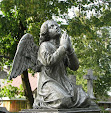
Image taken from http://commons.wikimedia.org/wiki/Image:The_changeling,_John_Bauer,_1913.jpg
The concept of the changeling is an interesting one for me, but I guess that goes without saying. Imagine tucking your sweet, lovely baby in for the night and going to sleep. Tomorrow morning, when you wake up, there is something else in its place. Something not so human. Any mother or father's nightmare.
This is where the changeling comes in. Faery babes can tend toward sickliness. Or perhaps the Fae finds a human babe to be pretty or wants a little toy to play with until they grow sick of it, or perhaps they just feel like playing a trick on humans. Well, that's no problem. Just take a human babe and swap it with a sickly Fae offspring. Or in some cases, an enchanted piece of wood, called a stock may be placed in the cradle. The Scottish folklore has a more sinister reason for changelings, the human babes as used as a tithe for Hell, as the Faefolk are forbidden from Heaven. In some folklore, an unbaptized child is more likely to be stolen by trolls.
Perhaps initially, the mother or father might not know the difference right away. Until the signs of a changeling manifest themselves. These signs include: voracious appetite, malicious temperament, troubled movement, or unusual wisdom. In Welsh folklore, initially the changeling very closely resembles the human child, but gradually becomes more ill-tempered, unattractive, and malformed, given to screaming and biting. Welsh wisdom offers the following method to tell if your child has been replaced by a changeling: cook a meal in an eggshell. The changeling will become so confounded, it will disappear, and the true human child will reappear in its place. In Irish folklore, left-handed people were thought be be Fae changeling. No wonder I never fit in!
There are more sinister ways to tell if one's child is a changeling, which sound uncomfortably close to child-abuse, and frankly bring to mind Munchausen by Proxy, so we won't go into those. A Scandinavian story cautions against mistreating the changeling. A woman and her husband realize their child has been replaced by a troll-child, but the wife refuses to mistreat the troll-child. Eventually the husband leaves her, and encounteres their true child, who had been freed by the trolls, because of the wife's care of their own offspring. He tells his father that it was good that they treated the troll-child well, because each mistreatment visited upon the troll child would have been visited on the true child.
Protecting one's child from being stolen involved various methods: laying a steel object such as scissors or a knife on the cradle of an unbaptized child, according to Scandavian folklore, and the Irish believed that staring at a baby with envy would leave it vulnerable to being stolen.
Changelings in literature and the media:
Changelings on TV:
- Star Trek had an episode called "The Changeling" in which a earth probe which was damaged merged with an alien probe and wreaks havoc
- So Weird also has an episode called "The Changeling" in which the tv show characters are forced to babysit a changeling
- Supernatural's episode "The Kids are Alright" features a changeling, although their version featured a creature which assumed the form of a children and sucked energy from their parents
- Doctor Who uses a variation of the changeling motif in "Attack of the Graske," in which the Graske attack humans and leave a changeling form of the humans, with eyes that glow
Changelings in Books:
- William Butler Yeats wrote a poem called The Stolen Child about a boy replaced by a changeling
- In H.P. Lovecraft's "Pickman's Model", the subterrean monsters replace human children with their young
- Poul Anderson's story The Broken Sword
- The Iron Dragon's Daughter by Michael Swanwick
- Tithe: An Modern Faerie Tale by Holly Black
- The Moorchild by Eloise McGraw
- Low Red Moon and Daughter of Hounds by Caitlin Kiernan
- War of the Flowers by Tad Williams
- Stones Unturned by Thomas Sniegoski and Christopher Golden
- Faerie Baby by Lin Spicer
- Poison by Chris Wooding
- The play A Midsummer Night's Dream by William Shakespeare has a plot the revolves around Faerie King and Queen Oberon and Titania's fight over a changeling boy
The changeling myth has been pervasive in most cultures, probably because it hits at the heart of a parent's fear that their child is somehow abnormal. The fears of a child that is not healthy. I don't have kids ,but I can imagine how that might feel. And back in ancient times, when the understanding of science and disease was limited, I imagine it must have eased a parent's feelings of guilt to think that the Good People had no small part in their child's ailment.
References
Changeling-Wikipedia, The Free Encyclopedia . http://en.wikipedia.org/wiki/Changeling. Last modified 27 September 2008. Accessed 27 September 2008.


No comments:
Post a Comment